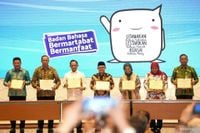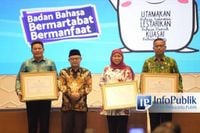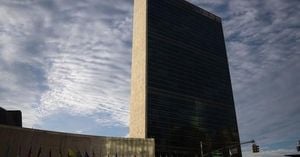On April 25, 2025, Indonesian Minister of Home Affairs Tito Karnavian addressed a pressing issue at the launch of the Guidelines for Monitoring the Use of Indonesian and the Joint Commitment to Upholding the Sovereignty of the Indonesian Language. The event took place at the Ministry of Basic and Secondary Education in Jakarta, where Karnavian highlighted that many citizens still struggle to communicate effectively in Indonesian, often relying solely on local dialects.
Karnavian's remarks came as part of a broader initiative aimed at promoting the use of the national language across various regions. He called on local governments to develop programs that support the use of Indonesian, emphasizing the importance of preserving the language as a unifying force within the nation. "We agree on this topic. We will work together to socialize this to the authorities in the regions," he stated.
The challenge, according to Karnavian, lies in ensuring that local populations can grasp and use Indonesian properly. He expressed the Ministry's commitment to assist in creating a budgeting system that would enable local governments to implement these supportive programs effectively. Once these initiatives are included in the Regional Revenue and Expenditure Budget (APBD), they will be mandatory for local authorities to execute.
Moreover, Karnavian proposed that regions excelling in promoting the use of Indonesian should receive recognition and potentially fiscal incentives. He suggested that the Ministry of Finance could be approached for financial rewards for these regions, which would further encourage the preservation and intensification of Indonesian as the official language. "If necessary, we will ask the Minister of Finance for fiscal incentives for regions that excel in promoting the use of Indonesian," he explained.
In conjunction with Karnavian's efforts, the Ministry of Basic and Secondary Education, led by Minister Abdul Mu’ti, also launched Permendikdasmen Number 2 of 2025. This regulation serves as a framework to maintain the sovereignty of the Indonesian language in official documents and public spaces. Mu’ti noted the alarming trend of excessive foreign language use in various media and expressed hope that this new regulation would help improve language practices across the country.
During the launch, Mu’ti remarked, "Indonesian plays a strategic role in building national character, strengthening national insight, and creating order in public spaces and official documents." He underscored the need for collective efforts to elevate Indonesian as the language of science and technology, acknowledging that many officials, including himself, often resort to foreign languages in their speeches.
Mu’ti's vision extends beyond mere communication; he aspires for Indonesian to gain recognition as a language of knowledge. He pointed out that Indonesia's acknowledgment of Indonesian as an official language by the United Nations Educational, Scientific and Cultural Organization (UNESCO) is a significant milestone. "We are respected not only for our physical appearance or attire but also for the way we speak. A good and polite language reflects self-respect and becomes a mirror of dignity," he stated.
In support of these initiatives, Hafidz Muksin, head of the Language Agency, highlighted the importance of integrating language proficiency materials into new employee orientation programs. This strategy aims to foster a culture of using Indonesian effectively, ensuring that the sovereignty of the national language is respected and utilized as a tool for thought and national identity.
"The sovereignty of the national language is expected to be realized through a positive attitude towards the use of Indonesian as a means of thinking and a way to shape the nation's identity," Muksin emphasized.
Karnavian reiterated the necessity of local governments' support in realizing policies related to the sovereignty of the Indonesian language. He also acknowledged the importance of recognizing regional languages as part of Indonesia's rich cultural heritage. However, he firmly stated that Indonesian must remain the primary language and unifying tool, especially in formal events.
The combined efforts of the Ministry of Home Affairs and the Ministry of Basic and Secondary Education reflect a significant commitment to enhancing the role of Indonesian in both public and private sectors. As Indonesia continues to navigate globalization and the influence of foreign languages, these initiatives aim to reinforce national identity and unity through the promotion of the Indonesian language.
In conclusion, the launch of the guidelines and regulations marks a crucial step toward preserving and promoting the use of Indonesian. With a focus on education, local governance, and cultural recognition, the Indonesian government is taking proactive measures to ensure that the national language remains a vital part of the country's identity and communication.





